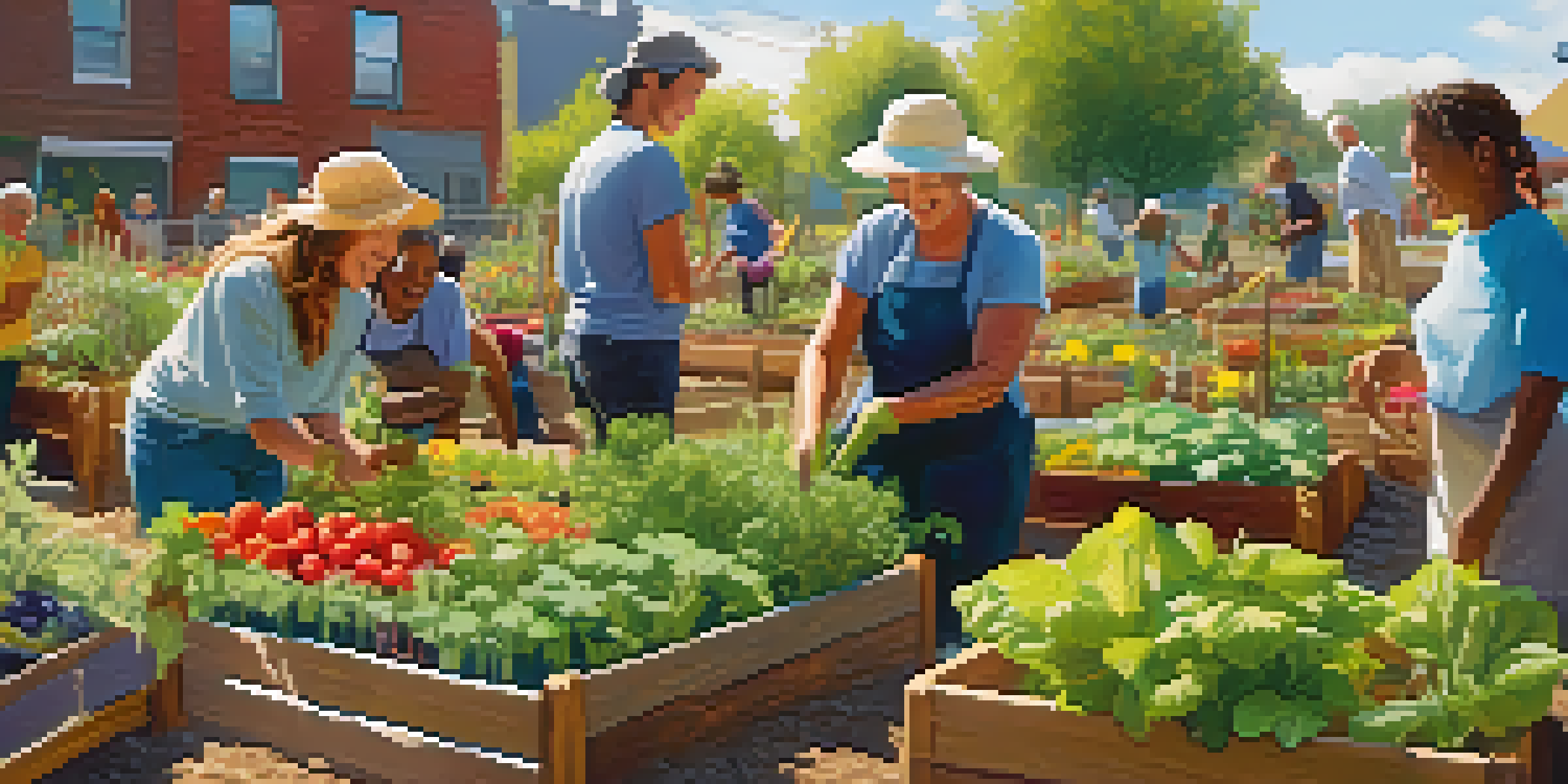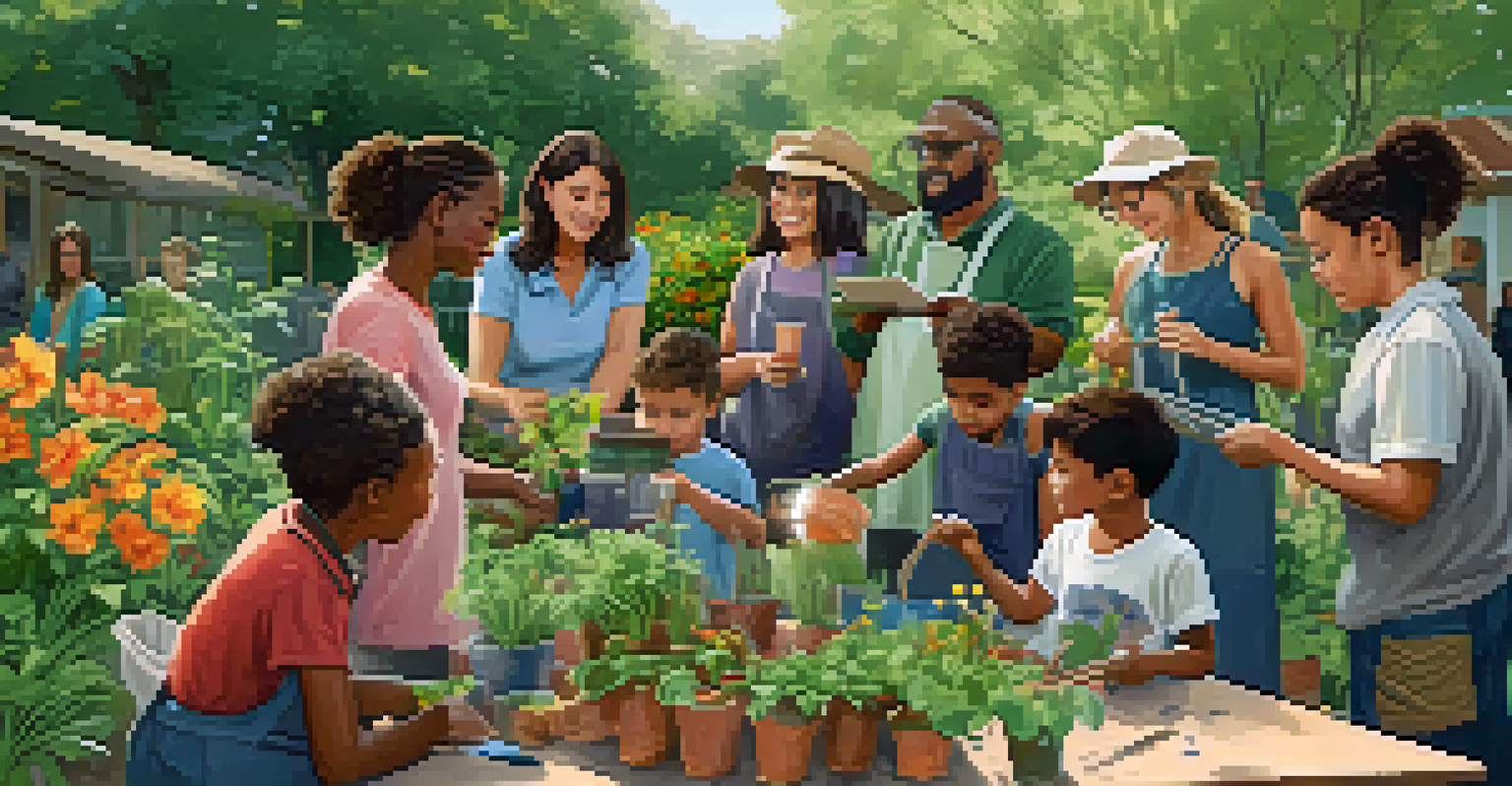Exploring the Link Between Community Gardening and Wellness

Understanding Community Gardening and Its Popularity
Community gardening has grown exponentially in recent years as people seek to reconnect with nature and their neighborhoods. These gardens are more than just patches of green; they serve as vibrant community hubs. They provide a space for individuals to come together, share knowledge, and cultivate both plants and friendships.
Gardening is the purest of human pleasures.
The rise of urban gardening reflects a growing awareness of sustainability, food security, and the importance of green spaces in cities. As communities face challenges like food deserts and urban sprawl, gardening offers a practical solution to these issues. People are increasingly turning to their local gardens to grow fresh produce, fostering a sense of ownership and responsibility.
Moreover, community gardens often encourage participation from a diverse group of individuals, bridging cultural gaps. This collective effort not only beautifies neighborhoods but also strengthens social ties. In essence, these gardens are a testament to the power of collaboration, nurturing both the earth and community spirit.
The Physical Benefits of Gardening for Community Health
Engaging in community gardening brings a plethora of physical health benefits. It's a fantastic way to incorporate exercise into daily routines, as tasks like digging, planting, and weeding offer a full-body workout. Studies show that even moderate physical activity can significantly improve cardiovascular health and overall fitness.

In addition to exercise, gardening encourages better eating habits. When individuals grow their own fruits and vegetables, they’re more likely to incorporate these nutritious foods into their meals. This not only enhances diet quality but also promotes awareness of food sources and sustainability.
Community Gardens Foster Connection
These gardens serve as vibrant hubs that bring people together, promoting social interaction and inclusivity.
Furthermore, gardening outdoors allows for exposure to sunlight, which is crucial for vitamin D production. This vitamin supports bone health and boosts the immune system. So, by simply getting your hands dirty in the soil, you're also nurturing your body and improving your health.
Mental Health Benefits: Gardening as Therapy
The therapeutic effects of gardening are well-documented, making it a powerful ally in mental health. Spending time in nature has been shown to reduce stress, anxiety, and depression. The act of nurturing plants can be meditative, providing a sense of purpose and accomplishment.
The best time to plant a tree was twenty years ago. The second best time is now.
Community gardens create a supportive environment where individuals can share their experiences and emotions. This social interaction can combat feelings of loneliness and isolation, as participants often form strong bonds with fellow gardeners. The shared joy of watching plants grow together fosters a sense of belonging.
Moreover, the rhythmic, repetitive tasks involved in gardening can help clear the mind. Similar to practices like yoga or mindfulness, gardening encourages individuals to focus on the present moment. This mental shift can lead to improved emotional regulation and resilience against life's challenges.
Building Community Through Shared Gardening Experiences
Community gardening acts as a catalyst for social interaction and collaboration. When people come together to cultivate a garden, they share not just the workload but also stories, skills, and laughter. These shared experiences can break down barriers and encourage inclusivity among diverse groups.
Gardens often host events, workshops, and celebrations that foster a sense of community pride. These gatherings provide opportunities for learning and collaboration, reinforcing the idea that working together yields richer results. Plus, such events can attract new members, expanding the garden’s impact even further.
Gardening Benefits Physical Health
Engaging in community gardening provides a full-body workout and encourages healthier eating habits.
As friendships grow among participants, so does the overall well-being of the community. The connections formed in these gardens often extend beyond the gardening season, creating lasting bonds that contribute to a vibrant community life. Ultimately, these interactions enrich the social fabric of neighborhoods.
Sustainability and Environmental Awareness Through Gardening
Community gardens play a significant role in promoting environmental sustainability. By growing food locally, these initiatives reduce the carbon footprint associated with transporting produce. Participants learn about sustainable practices, such as composting and organic gardening, which can be applied in their own lives.
Moreover, these gardens often serve as habitats for local wildlife, enhancing biodiversity in urban areas. When communities prioritize green spaces, they contribute to a healthier ecosystem, benefiting both flora and fauna. This connection to nature fosters a deeper appreciation for the environment.
As community members engage in gardening, they become more aware of their ecological impact. This newfound knowledge often leads to more environmentally conscious behaviors, such as reducing waste and conserving resources. In this way, community gardening becomes a powerful tool for fostering sustainability.
The Role of Education in Community Gardening Initiatives
Education is a vital component of community gardening, equipping participants with essential skills and knowledge. Many gardens offer workshops on topics like organic farming, pest management, and soil health, empowering individuals to become proficient gardeners. This hands-on learning experience can inspire lifelong gardening habits.
Additionally, community gardens often partner with local schools to teach students about the importance of agriculture and nutrition. Such programs encourage children to connect with their food sources and understand where their meals come from. This foundational knowledge can shape healthier eating habits for generations.
Education Enhances Gardening Skills
Community gardens often offer educational workshops that empower individuals with essential gardening knowledge.
By fostering a culture of education, community gardens not only enhance gardening skills but also promote environmental stewardship. Participants learn the significance of sustainable practices and the importance of caring for the planet. This educational aspect underscores the long-term benefits of gardening within communities.
Challenges Facing Community Gardening Initiatives
Despite the numerous benefits of community gardening, these initiatives face several challenges. Limited access to land, funding, and resources can hinder the establishment of new gardens. Additionally, existing gardens may struggle to maintain their operations due to lack of volunteers or support.
Moreover, seasonal changes can impact gardening activities, making it difficult to keep participants engaged year-round. Gardeners may find themselves overwhelmed during planting or harvest seasons, leading to burnout. Finding a balance between workload and enjoyment is crucial for sustaining enthusiasm.

Finally, community gardens must navigate local regulations and policies, which may sometimes pose barriers. Zoning laws, water access, and property rights can complicate gardening efforts. Addressing these challenges requires collaboration and advocacy to ensure that these green spaces continue to thrive.